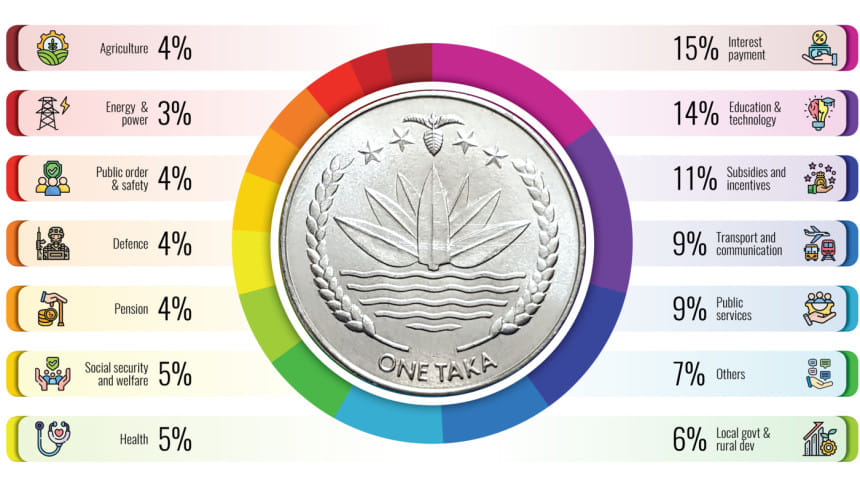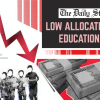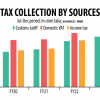Budget leaves regressive tax system unchanged

The national budget for the coming year shows no clear shift in tax policy, as the system continues to depend heavily on indirect and trade taxes, according to economist Zaidi Sattar.
This keeps the tax structure regressive and places an unfair burden on low and lower-middle-income groups, said Sattar, the chairman of local think tank Policy Research Institute of Bangladesh (PRI).
This not only weighs on those least able to bear it but also holds back private initiatives, Sattar said at a post-budget discussion in Dhaka yesterday.
He described the government's failure to rationalise tax exemptions as a missed opportunity.
Finance Adviser to the interim government Salehuddin Ahmed announced the Tk 7.90 lakh crore budget for fiscal year (FY) 2025–26 on June 2. It was passed on Sunday by the advisory council and will be effective from July 1.
Responding to criticism that the budget offers no real break from previous years, the finance adviser acknowledged his conservative approach and said the budget was drawn up with a focus on what was realistic and achievable.
Ahmed, also an economist and a former governor of the central bank, said the measures are to preserve macroeconomic stability and keep red-hot inflation in check.
At the post-budget talk titled "Budget Insights: Challenges and Opportunities Ahead" yesterday, Sattar welcomed these efforts, saying the focus on stabilisation is commendable in the face of inflationary pressures and external risks.
Even so, he commented that some budget measures could end up fuelling inflation.
The increase in advance tax is meant to recover revenue lost through value-added tax (VAT) evasion, but it may push up consumer prices and add to inflationary pressure, he said.
Sattar said meeting the target of 5.5 percent gross domestic product (GDP) growth in the next fiscal year will depend on how well the annual development programme is implemented and whether private investment can be encouraged.
He sounded critical of the budget for being weak on redistributive measures, with allocations for health, education and social protection staying flat. This, too, Sattar called a missed opportunity.
The economist said Bangladesh must increase competitiveness and productivity to support economic diversification and create more jobs. Tariff cuts need to be matched by stronger efforts to raise income tax and VAT revenue.
He highlighted two major hurdles that lie ahead – Bangladesh's graduation from the least developed country club next November and potential higher tariffs on Bangladeshi goods entering the US market.
On items sourced from Bangladesh, the Trump administration announced a 37 percent "reciprocal tariff" in April this year, though this has been paused until July.
Sattar said both challenges require bold reforms and urgent policy responses.
The event was jointly organised by the Metropolitan Chamber of Commerce and Industry (MCCI) and PRI at the MCCI office in the Gulshan area of the capital.
Speaking at the programme, MCCI President Kamran T Rahman said the Finance Ordinance 2025 has accepted several proposals of the chamber.
These include doubling the perquisite ceiling for annual fringe benefits for serviceholders, such as accommodation and car facilities, to Tk 20 lakh per employee.
Besides, shifting tax deducted at source return filing from monthly to quarterly, and extending the VAT adjustment period from three to six tax periods were among MCCI's recommendations.
"However, we remain deeply concerned about certain aspects of the budget. Most notably, the proposed increase in turnover tax from 0.6 percent to as much as 1 percent across almost all sectors," said Rahman.
Anisuzzaman Chowdhury, special assistant to the chief adviser, acknowledged that the country has a very low revenue base and one of the lowest tax-to-GDP ratios in the region.
"We simply cannot do everything because of this," he said.
"Our fundamental problem is that we do not feel an obligation to pay taxes. It is not a perfect budget, but it is business-friendly. We have taken steps in the right direction."
Chowdhury identified policy coordination, coherence, and integration as key challenges facing Bangladesh.

 For all latest news, follow The Daily Star's Google News channel.
For all latest news, follow The Daily Star's Google News channel. 







Comments